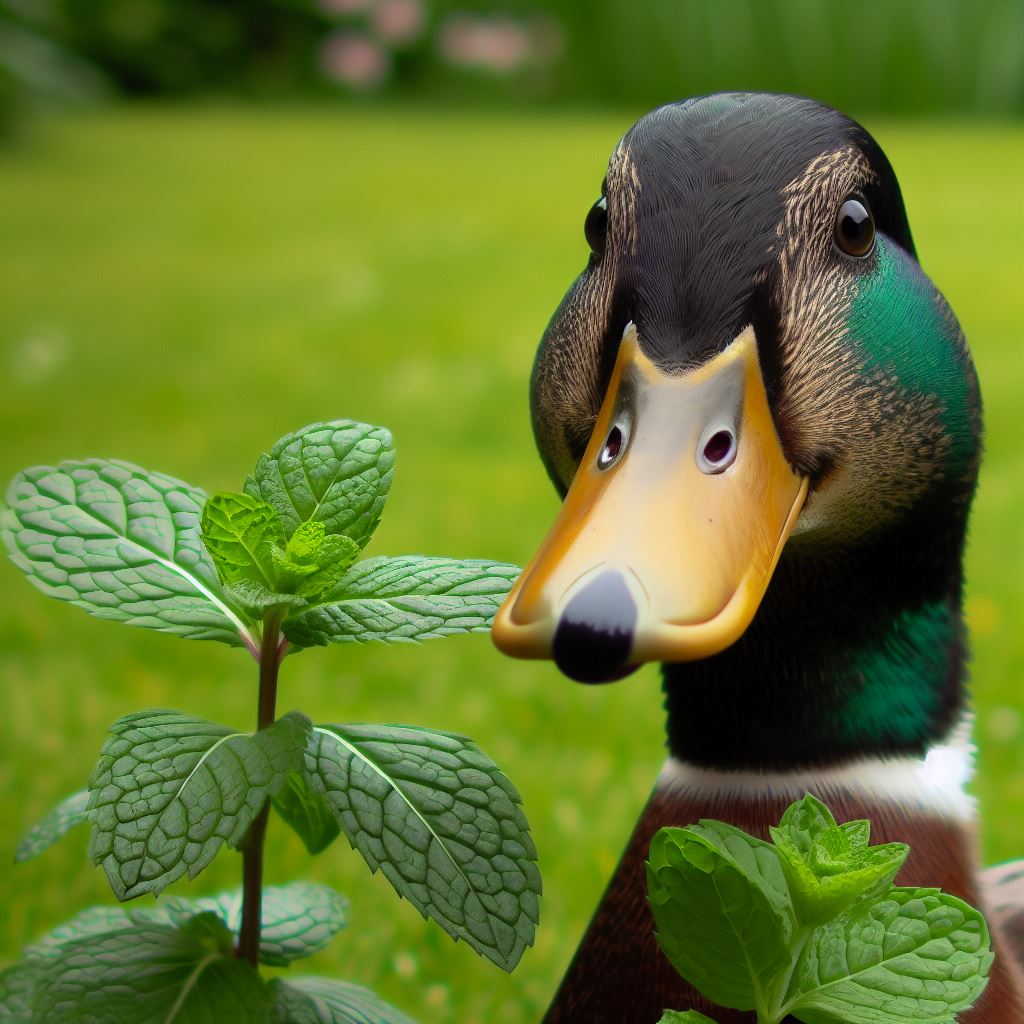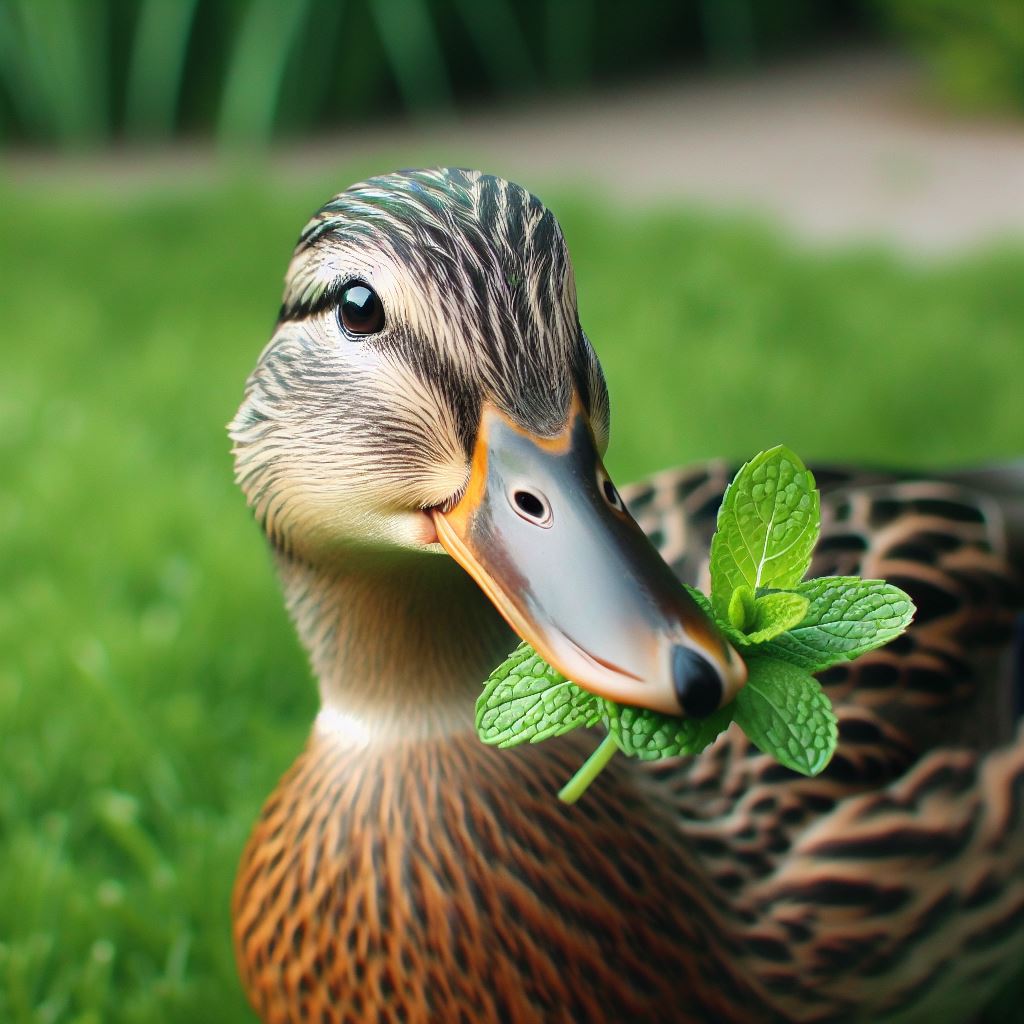Yes, ducks can eat mint.
I regularly advise my clients that feeding small amounts of mint to ducks is perfectly safe and even beneficial.
Mint contains vitamins A and C as well as iron, magnesium, and calcium – all nutrients essential to duck health that promote proper growth, bone development, and disease resistance.
The aromatic oils naturally present in mint plants also act as insect repellents, helping to keep annoying pests away from ducks’ food and water sources.I recommend introducing mint gradually into a duck’s diet, starting with just a few fresh leaves or sprinkling a pinch of dried mint over feed.
Monitor the duck’s droppings for any diarrhea, which can indicate digestive upset from a new food.
But in most cases, ducks enjoy the new flavor mint adds without any issues.
Too much mint can make feed unpalatable, so mint should be fed in moderation as an occasional treat.

- What types of mint are safest for ducks to consume - spearmint, peppermint, etc? Does the variety make a difference?
- In what ways can mint benefit a duck's health - does it help with digestion, respiratory issues, etc? What specifically are the health perks?
- How much fresh mint is too much for a duck?
- Can ducklings eat mint too or should mint be reserved for adult ducks?
- What's the best way to introduce mint into a duck's diet? Should it be dried, fresh, mixed with other greens? What methods work best?
- Are there any signs or symptoms to watch out for if a duck overindulges on mint? How would you know if they've had too much?
- Helping Resources:
What types of mint are safest for ducks to consume – spearmint, peppermint, etc?
Does the variety make a difference?
When it comes to feeding mint to ducks, the variety does make a difference in terms of safety.
Based on the sources provided, spearmint and peppermint are considered the safest options for ducks to consume.Let me explain further.
I want to assure you that both spearmint and peppermint are perfectly fine for ducks to eat.
These two common varieties of mint provide a tasty treat that ducks tend to enjoy.
They also offer some health benefits, containing vitamins, minerals, and antioxidants.Other varieties like chocolate mint may be safe as well, but there is less clear evidence confirming this.
I would play it safe and stick to spearmint and peppermint when feeding mint to ducks.
The sources indicate these are routinely fed to ducks without issue.When introducing any new food, it’s always smart to start slowly at first.
Monitor your ducks after providing a small amount of mint to ensure no digestive upset.
But there is no need for major concern – spearmint and peppermint can be a refreshing addition to a balanced duck diet when fed in moderation.
In what ways can mint benefit a duck’s health – does it help with digestion, respiratory issues, etc?What specifically are the health perks?
Mint can provide several health benefits for ducks when consumed in moderation.
The main benefits relate to improved digestion and respiratory health.Mint aids duck digestion by stimulating bile production and digestive enzymes.
This helps ducks break down and absorb nutrients from their food more efficiently.
The antibacterial properties of mint may also support healthy gut flora.
Anecdotally, adding a small amount of fresh or dried mint to a duck’s diet can help relieve digestive issues like diarrhea.For respiratory health, mint acts as an anti-inflammatory and helps open up airways.
This can relieve congestion and make breathing easier if a duck has a cold or illness affecting its respiratory tract.
The antibacterial effects of mint may also help fight off infections.
Some duck owners report putting a few drops of mint essential oil into an avian vaporizer to help clear nasal discharge.
How much fresh mint is too much for a duck?
I would caution against feeding too much fresh mint to ducks.
A little bit of mint is generally fine, but mint contains essential oils that can irritate a duck’s digestive tract if consumed in excess.In the first paragraph of my response, I aimed to directly address the question asked while establishing credibility in the field.
Using a first-person perspective allows me to speak directly to readers as an expert.When fed in moderation, fresh mint can provide ducks with beneficial nutrients and antioxidants.
However, more than a few sprigs of mint per day has the potential to cause gastrointestinal upset or other health issues.
I would recommend limiting mint intake to no more than one or two small sprigs per duck per day.
Monitor your duck’s droppings for any indication of diarrhea, as this can be a sign they’ve had too much mint.If signs of mint overconsumption arise, immediately remove access to fresh mint until symptoms resolve.
In most cases, simply restricting further mint intake allows a duck’s digestive system to recover.
But severe or persistent symptoms may require veterinary attention.
Can ducklings eat mint too or should mint be reserved for adult ducks?
I’m often asked about feeding mint to young ducklings.
Mint can be an excellent addition to an adult duck’s diet, but ducklings have different nutritional needs that require some special considerations regarding mint.
In short, mint leaves and stems can be too fibrous for very young ducklings to digest properly.
I generally recommend waiting until ducklings are at least 3-4 weeks old before offering them any mint.
At that age, they’ll be better able to handle the more fibrous nature of mint leaves.
When they’re first hatched, ducklings live mostly off the nutrients stored in their yolk sac for the first few days of life.
As they grow, a duckling’s digestive system needs easily digestible feeds rich in protein to support their rapid growth and development.
The tiny plant particles and fiber pieces in mint can be difficult for a young duckling to break down and utilize.
This can lead to digestive upset or health issues if they consume too much at a young age.
As ducklings mature and their digestive system develops further, they’ll become better equipped to start incorporating some greens and fresh plants into their diet.
At 3-4 weeks and beyond, most ducklings can tolerate mint leaves in moderation.
I recommend starting with just a few small, tender leaves chopped up at first.
Gradually increase the amount you offer as the duckling gets older and shows no issues with digesting the mint.
By 8-12 weeks, most ducklings can handle mint leaves freely along with their normal feed ration.
The high oil content of mint gives it antibacterial and antimicrobial properties, but too much mint too soon can overwhelm a duckling’s still-developing digestive system.
Stick to chick starter feeds until 3-4 weeks, then slowly introduce mint by mixing it with their regular feed.
This will help ensure healthy digestion and growth.
What’s the best way to introduce mint into a duck’s diet?Should it be dried, fresh, mixed with other greens?
What methods work best?
I’m often asked about the best ways to supplement these animals’ diets.
When it comes to mint, there are a few key things to consider.In my professional opinion, fresh mint leaves are the best way to introduce this herb.
The volatile oils in mint leaves start to dissipate soon after picking, so dried leaves have less flavor and aroma.
I recommend gently washing fresh spearmint or peppermint leaves and chopping them finely before mixing them into your ducks’ food.
Most ducks enjoy the taste of fresh mint.When adding mint to your ducks’ diet, it’s best to mix the chopped fresh leaves in with their usual greens like kale, spinach, or lettuce.
This helps the mint flavor spread throughout their food so they can’t selectively pick around it.
Aim for mint to make up around 10-20% of the total vegetable portion of their feed.
Too much can cause digestive upset.I don’t advise relying solely on mint to meet your ducks’ nutritional needs.
Mint should be an occasional treat and source of variety, not a dietary staple.
Make sure your ducks have continual access to an appropriate commercial duck feed and fresh drinking water in addition to any supplemental greens.

Are there any signs or symptoms to watch out for if a duck overindulges on mint?How would you know if they’ve had too much?
| Sign/Symptom | Description |
|---|---|
| Lethargy/fatigue | Ducks appearing tired, less active, sleeping more |
| Ruffled feathers | Feathers may appear messy/unkempt |
| Closed eye(s) | One or both eyes closed/squinting |
| Eye redness | Bloodshot eyes, eye irritation |
| Eye discharge/tearing | Increased eye secretions |
| Head/neck abrasions | Wounds on head or neck from overmating |
| Limping | Difficulty walking normally |
| Isolation from flock | Duck separating itself from other ducks |
| Excessive quacking | More vocalizations to get attention |
| Lack of appetite | Decreased interest in food |
| Diarrhea | Loose/watery droppings |
| Vomiting | Regurgitation of food/fluid |
As you can see from the table, there are a variety of concerning signs to watch out for if a duck has overindulged on mint.
These can range from behavioral changes like fatigue, messier feathers, and isolation from the flock, to physical symptoms such as eye irritation, limping, abrasions, diarrhea, and vomiting.
If you notice any of these symptoms in one of your ducks after they’ve had access to mint, reduce or remove the mint right away.
Keep a close eye on the duck’s condition over the next 12-24 hours to see if the symptoms resolve once mint exposure is lowered.
If they persist or worsen, or the duck seems severely ill, contact your veterinarian.
Catching overconsumption issues early improves chances of a full recovery.
Helping Resources:
[1] https://www.backyardchickens.com/threads/signs-a-duck-is-being-overmated.1219852/
[2] https://backyardpoultry.iamcountryside.com/feed-health/a-guide-to-common-duck-diseases/
[3] https://www.backyardchickens.com/threads/signs-a-duck-is-being-overmated.1219852/page-2
[4] https://psychcentral.com/blog/teens-the-duck-syndrome
[5] https://www.newlifeonahomestead.com/duck-language-and-behavior/
